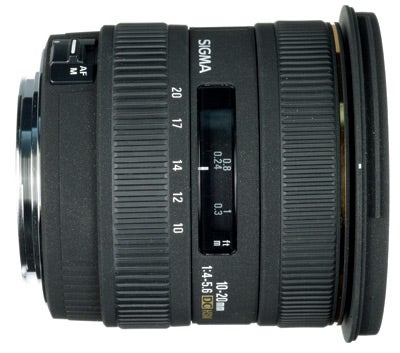Very good resolution but prone to fringing...
Sigma 10-20mm f/4-5.6 EX DC HSM Review
Sigma makes this lens for a variety of mounts, but only the Nikon, Canon and Sigma mount versions have the HSM, or Hyper Sonic Motor function – Pentax and Sony versions don’t.
Otherwise the lens is constructed from fourteen elements in ten groups. Of those elements, one is a glass-moulded aspherical lens, and two are hybrid asphericals. The optical train also features three SLD (Super Low Dispersion) lenses.
This is a heavier unit at 470g, with high construction values. The traditional Sigma EX finish doesn’t suit everyone’s taste, though I like its matt hammerite-like look. The rubber zoom and focus rings certainly feel secure, but there’s slightly more resistance in the zooming action than on competing models. The focus ring is slightly stiff too, though has a comforting dampened feel to it, making it feel very smooth.
The version we tested has the HSM motor, which is quiet and quick, but has a slightly juddery feel.
Image Quality
Sigma usually makes very respectable wideangle lenses, and it has been a pioneer in wideangle zooms. However, the results from the 10-20mm lens could be better. Corner sharpness is a particular bugbear; the Sigma lens simply displayed more instances of corner smudging than any of the other lenses on view. Central sharpness is good, but not outstanding, while fringing is apparent at times throughout the examples I shot.
The Imatest lab tests show very good resolution, second to Nikon at widest angle, but it is the most prone to fringing, by quite a high degree. At 20mm this is better controlled, while distortion is very well controlled throughout the range. (NB: Many of the lenses shortcomings can be corrected with DxO Optics Pro which has settings specifically for this lens)
Verdict
Some lack of critical sharpness, particularly in the corners, combined with poor control of chromatic aberration has let down what could be a great optic for the price.





